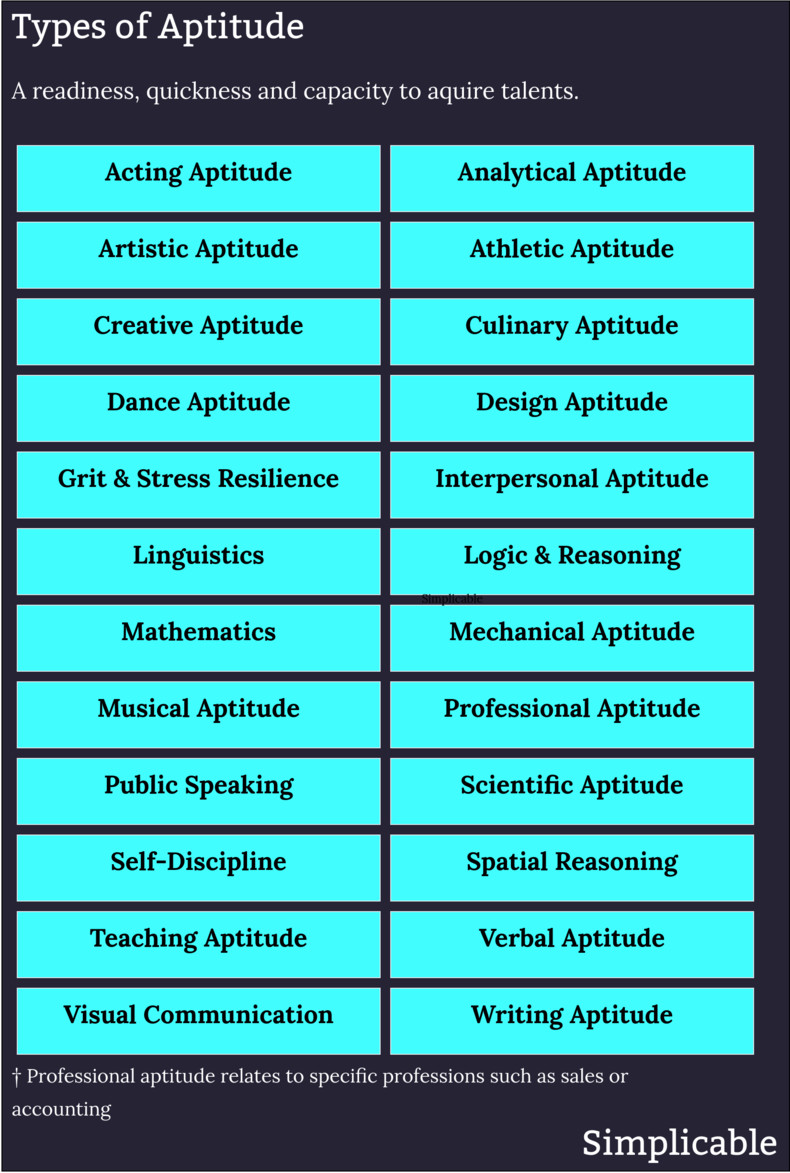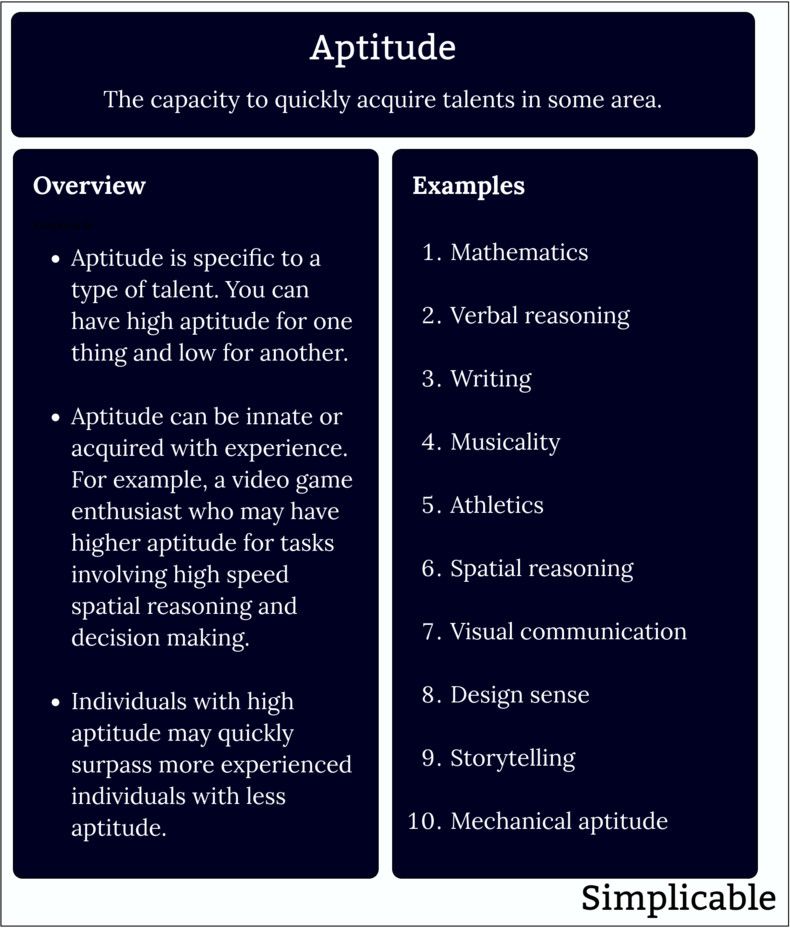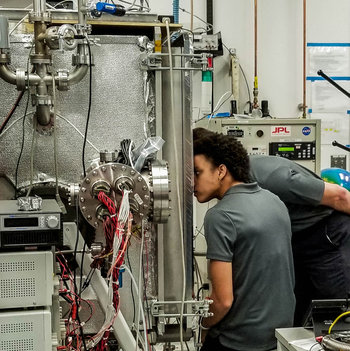
Abstract reasoning | Acting aptitude |
Adaptability | Analytical aptitude |
Artistic aptitude | Athletic aptitude |
Coaching | Coding |
Conflict resolution | Counseling aptitude |
Creativity | Critical thinking |
Culinary aptitude | Customer service |
Dance aptitude | Data interpretation |
Data science | Dealing with ambiguity |
Dealing with pressure & stress | Decision-making aptitude |
Design sense | Design thinking |
Diagnostic aptitude | Diligence |
Driving aptitude | Empathy & compassion |
Engineering | Entrepreneurial aptitude |
Finance aptitude | Game aptitude |
Gardening aptitude | Leadership |
Learning aptitude | Linguistic aptitude |
Logic | Marketing |
Martial arts aptitude | Mathematics |
Mechanical aptitude | Medical aptitude |
Memory recall | Mental focus |
Multitasking aptitude | Musical aptitude |
Negotiation | Numerical reasoning |
Pattern recognition | Photography aptitude |
Physical aptitude such as balance | Pilot aptitude |
Political aptitude | Problem-solving |
Public speaking | Reading comprehension |
Reading people | Resourcefulness |
Risk taking aptitude | Sales |
Scientific aptitude | Self-control |
Self-direction | Singing aptitude |
Situational awareness | Social aptitude |
Spatial reasoning | Strategy aptitude |
Systems thinking | Teaching |
Technical aptitude | User experience aptitude |
Verbal communication | Verbal reasoning |
Visual communication | Visual reasoning |
Writing & literature |
Fluid Intelligence
Fluid intelligence is the ability to solve problems in novel domains where you have no previous knowledge.Artistic Aptitude
A sense for fine art. This can be described as an intuitive sense of visual emotion and beauty.Optimism & Pessimism
An optimistic disposition may be an advantage to creative pursuits and a pessimistic disposition may be an advantage to conventional professions with well defined procedures such as accounting and carpentry.Sociability
A fondness for meeting people and spending time socializing.Charisma
A compelling personal presence that inspires devotion in others. Important to leadership and professions such as acting.Self-Discipline
The ability to focus on tasks and complete work.Motivation
Intrinsic motivation and response to extrinsic motivation. For example, an artist with an intense and unstoppable desire to reach the top of the art world may have more potential as an artist than an individual who is only half-committed.Introspection
The ability to understand yourself including your motives, emotions, thoughts and character. This includes the ability to identify and override your own biases.Risk Taking
A willingness to take calculated risks and an aptitude for estimating risk and seeing ways that it can be reduced.Curiosity
A strong motivation to know the unknown.Openness to Change
A willingness to embrace change and try new things.Linguistic Intelligence
The ability to acquire and master language including your native language and second languages.Logic, Reasoning & Math
Intelligence related to logic, abstractions, reasoning and numbers.Emotional Intelligence
Emotional intelligence is the ability to read emotion and respond in some intelligent way. This includes the introspective ability to see your own emotions and manage their impact on your behavior.Agreeableness
The drive or tendency to be kind, sympathetic, cooperative, warm and considerate. Important for social roles such as parenthood and professions such as teaching.Spatial Intelligence
Spatial judgment and the ability to think visually.Existential Intelligence
An aptitude for handling difficult foundational questions. Applicable to areas such as philosophy and ethics.Musicality
An aptitude for music such as an ability to perceive and reproduce pitch, rhythm and harmony.Bodily-kinesthetic Intelligence
An aptitude for developing gross motor skills and fine motor skills.Interpersonal Intelligence
An aptitude for influencing people and leading groups.Situational Intelligence
Situational Intelligence is an ability to quickly understand fast moving situations and respond intelligently.Conscientiousness
The drive to be diligent, careful, precise, honest and to take responsibilities seriously. Essential to professions such as accounting.Intentionality
The ability to align your behavior to your values and goals.Convergent Thinking
Convergent thinking is the ability to find the correct answer to a question that has a definitive solution. Requires the patience and intelligence to apply existing systems to a problem.Divergent Thinking
Divergent thinking is the ability to find a reasonable solution to a question with no definitive answer. Requires a playful approach that considers a large number of possibilities without committing too early.Creativity
Creativity is the ability to create things and ideas that are new, non-obvious and valuable.Types
The following are common types of aptitude.
Summary
Aptitude is the capacity to quickly acquire new talents in some area. This can be innate or can be acquired with experience. For example, if you master a second language you may develop your aptitude for languages in general such that a third language is easier to learn.
| Overview: Aptitude | ||
Type | ||
Definition | A readiness, quickness and ability to acquire knowledge, skills and talents. | |
Related Concepts | ||








































